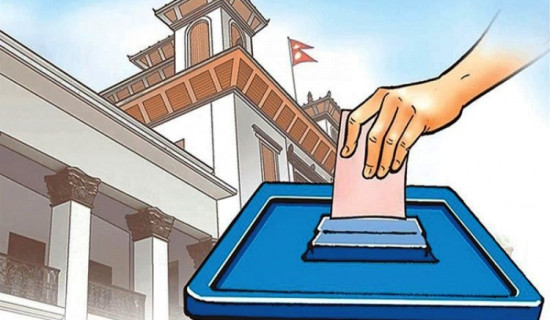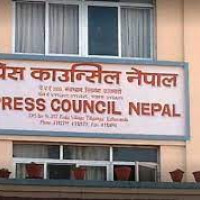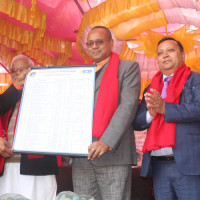- Thursday, 22 January 2026
Locals team up to rebuild damaged government buildings
By Amar Raj Naharki,Tanahun, Sept. 13: Various government offices in Damauli, the headquarters of Tanahun, were destroyed by arson during the Gen-Z movement. In response, there has been a call for immediate reconstruction through public labour.
Social activists, religious leaders, and local sanitation campaigners have emphasised that they themselves should mobilize labour and support reconstruction efforts, as the government's limited budget cannot immediately restore the damaged offices.
They believe that these offices in Tanahun can be rebuilt through citizen activism. They cite examples such as the community water tap initiative led by the Mayor of Dharan Sub-Metropolitan City, and voluntary labour contributions in road reconstruction projects.
There is now a widespread belief that reconstruction should not be the government's responsibility alone; local citizens, organizations, and activists must also play a role.
Social activist Sudeep Gaffar suggested launching a public labour donation campaign immediately, warning that if government buildings are not reconstructed soon, public services will be severely disrupted.
He said, “If the reconstruction of offices is not done immediately, public service will be affected. Common citizens will suffer, so it is necessary to rebuild the offices through financial assistance and voluntary labour.”
Gaffar also stated that assets accumulated through corruption should be confiscated and invested in productive sectors.
"Corrupt individuals should be punished, and if their assets can be used to serve the people, it will not only support reconstruction but also create jobs," he said.
Similarly, religious leader Dhyanacharya Khemraj Adhikari has expressed his commitment to involving his followers in reconstruction efforts. Personally engaged in cleaning up the burnt structures, Adhikari said, “We are the ones who will build the country, others will not do it for us.”
Sanitation activist Bhagyashali Dhungana also stressed the importance of strengthening the Shramdaan (voluntary labour) campaign. “When offices are destroyed, it affects the people who rely on public services, so it is important for all of us to work together,” said Dhungana.
Dozens of government offices in the district have been set on fire and vandalized. According to the District Police Office, Tanahun, the following institutions have been destroyed: the District Coordination Committee, Land Revenue Office, District Administration Office, District Court, District Jail, Drinking Water and Sanitation Division Office, Energy and Water Resources Development Division Office, and the District Attorney's Office.
Similarly, vehicles belonging to Byas Municipality have been torched, and the ward office of Byas Municipality-13, the Education Training Centre Tanahun, the Division Forest Office, the Internal Revenue Office, and several other technical offices have also been targeted by protesters.
The destruction of important documents and office equipment has made it difficult for the public to access services. Collapsed walls, burnt materials, and torn signage still serve as painful reminders of the violent protests. With public property under attack, day-to-day administrative and legal services have come to a halt.
However, local residents have shown growing interest in reconstruction. Some believe the Shramdaan campaign can be a constructive alternative to collective protests. Kabiraj Shrestha, a textile entrepreneur from Damauli and a member of Safasad, who has been actively involved in cleanup efforts, said, “If we all work together to restore the government offices, the administration can get back to serving the people.”
The local administration has also signaled support for mobilizing citizens through Janashramdaan (people’s voluntary labour). Chief District Officer Ramkrishna Adhikari said, “Initially, we are preparing to resume services from temporary buildings, but long-term reconstruction is essential. If the public participates, the process will be faster.”
















